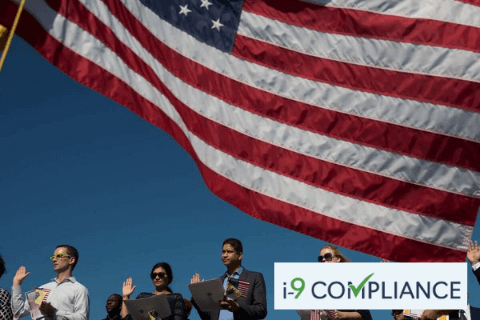A Little Known Section of the Immigration and Nationality Act Can Cause Big Problems for Employers

Employers who sponsor green card holders or employ several H-1B visa holders, as well as other temporary workers, should be careful to comply with Section 1324b of the Immigration and Nationality Act (INA). This section of the Immigration and Nationality Act is not well known, but failing to comply can get employers in trouble with the Labor Department, the Justice Department, and the lawyers of any plaintiffs who claim their rights have been violated.
The Immigration Reform and Control Act became law in 1986. This law enacted sanctions for employers who hire unauthorized immigrants. This Act led to the Form I-9 verification system that is used today. The Act also made it illegal for employers to discriminate against workers on the basis of their citizenship status during recruitment, hiring, and firing. Section 1324b protects United States citizens, some lawful residents, as well as individuals given refugee status or asylum. This section also allows employers to select a U.S. citizen for employment over a noncitizen if the two are equally qualified. This exception was included out of the fear that protecting foreign immigrant workers from discrimination based on citizenship status would, in effect, discriminate against U.S. workers.
Section 1324b is enforced by the Department of Justice’s Civil Rights Division. This includes any cases in which employers discriminated against U.S. workers by favoring temporary visa holders. The Department of Justice is authorized to start investigations, investigate charges by workers who feel they’ve been discriminated against, subpoena witnesses and documents, and file both class action style and individual lawsuits against employers.
Workers also are given authority by Section 1324b to file lawsuits themselves. Then, if these workers prevail in their lawsuit, they can recover attorneys’ fees and obtain back pay, injunctions, and civil penalties.
Any litigation involving Section 1324b starts out in the Office of the Chief Administrative Hearing Officer (OCAHO). Then, these rulings are reviewed by the U.S. Court of Appeals. The Department of Labor may also be involved in cases involving Section 1324b if temporary visa holders are involved. Additionally, since the DOL’s Wage and Hour Division is in charge of enforcing INA Protections for temporary visa holders, the Wage and Hour division is sometimes involved in enforcing 1324b as well.
If an employer wants to sponsor a foreign worker for permanent work authorization, they must first get permission from the Department of Labor before submitting an immigration petition to the Department of Homeland security. To do this, the employer must certify that there are no U.S. workers able, willing, qualified, and available to take the job. Employers must also certify that employing foreign workers will not have a negative impact on the wages and working conditions of similar U.S. workers. If an employer gives a false certification, they could receive criminal penalties.
The government has been enforcing Section 1324b, which in some cases has resulted in significant penalties for the companies found in violation of the law. One recent case involved a major social media company that violated Section 1324b. The settlement in the case required the company to pay up to 9.5 million to eligible victims along with 4.75 million in civil penalties.
The Department of Justice has announced that it intends to investigate employers “who discourage and refuse to hire eligible job applicants based on their citizenship or immigration status.”
Additionally, sometimes workers choose to file private lawsuits against companies for hiring practices they believe have discriminated against them due to their citizenship status.
Employer Takeaways
Considering the government’s increased enforcement of rules protecting U.S. workers, companies would do well to review the INA’s anti‑discrimination provision and make sure they follow any applicable laws when hiring temporary visa holders. Failing to comply with the INA could result in significant penalties as well as potential private lawsuits.